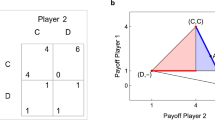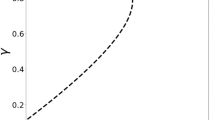Reality is a game, but you shouldn't take a game for reality
(Pragmaticist Proverb)
Abstract
This paper discusses the results of a single-shot Prisoner's Dilemma computer tournament. In the single-shot Prisoner's Dilemma tournament each pair of players interacts only once. But players can establish and detect reputations because they know how their current opponent has behaved in previous games with other players. The results show that cooperation is worthwhile, even in single-shot games, provided the outcomes of previous games are common knowledge.
Similar content being viewed by others
References
Aumann, R.: 1976, ‘Agreeing to disagree’,Annals of Statistics 4, 1236–1239.
Axelrod, R.: 1980a, ‘Effective choice in the Prisoner's Dilemma’,Journal of Conflict Resolution 24, 3–25.
Axelrod, R.: 1980b, ‘More effective choice in the Prisoner's Dilemma’,Journal of Conflict Resolution 24, 379–403.
Axelrod, R.: 1984,The Evolution of Cooperation, Basic Books.
Axelrod, R.: 1986, ‘An evolutionary approach to norms’,American Political Science Review 80, 1095–1111.
Fann, K. T.: 1970,Peirce's Theory of Abduction, Nijhoff.
Howard, J. V.: 1988, ‘Cooperation in the Prisoner's Dilemma’,Theory and Decision 24, 203–213.
Ketner, K. L.: 1992, ‘Peirce's Sentimental Conservatism’, in E. M. Barth and E. C. W. Krabbe (Eds),Logic and Political Culture, North Hol. P. C., pp. 3–9.
Kreps, D. M., Milgrom, P., Roberts, J. and Wilson, R.: 1982a, ‘Rational cooperation in the finitely repeated prisoner's dilemma’,Journal of Economic Theory 27, 245–252.
Kreps, D. M. and Wilson, R.: 1982b, ‘Reputation and imperfect information’,Journal of Economic Theory 27, 253–279.
Lubbe, J. C. A. van der and Nauta, D.: 1993, ‘Semiotics, pragmatism and expert systems’,Twente Workshop on Language Technology (Pragmatics in Language Technology, Enschede U.P.)4, pp. 6–24.
Milgrom, P. and Roberts, J.: 1982, ‘Predation, reputation, and entry deterrence’,Journal of Economic Theory 27, 280–312.
Oye, K. A. (Ed.): 1986,Cooperation under Anarchy, Princeton U.P.
Peirce, C. S.: 1958,Collected Papers 8, A. Burks (Ed.), Harvard U.P.
Pindyck, K. S. and Rubinfeld, D. L.: 1981,Econometric Models and Economic Forecast, McGraw-Hill (or any other basic textbook on econometrics).
Schuessler, R.: 1989, ‘The gradual decline of cooperation: endgame effects in evolutionary gametheory’,Theory an Decision 26, 133–155.
Sugden, R.: 1986,The Economics of Rights, Cooperation, and Welfare, Basil Blackwell.
Author information
Authors and Affiliations
Rights and permissions
About this article
Cite this article
Nauta, D., Hoekstra, J. Effective choice in the single-shot Prisoner's Dilemma tournament. Theor Decis 39, 1–30 (1995). https://doi.org/10.1007/BF01078867
Issue Date:
DOI: https://doi.org/10.1007/BF01078867




